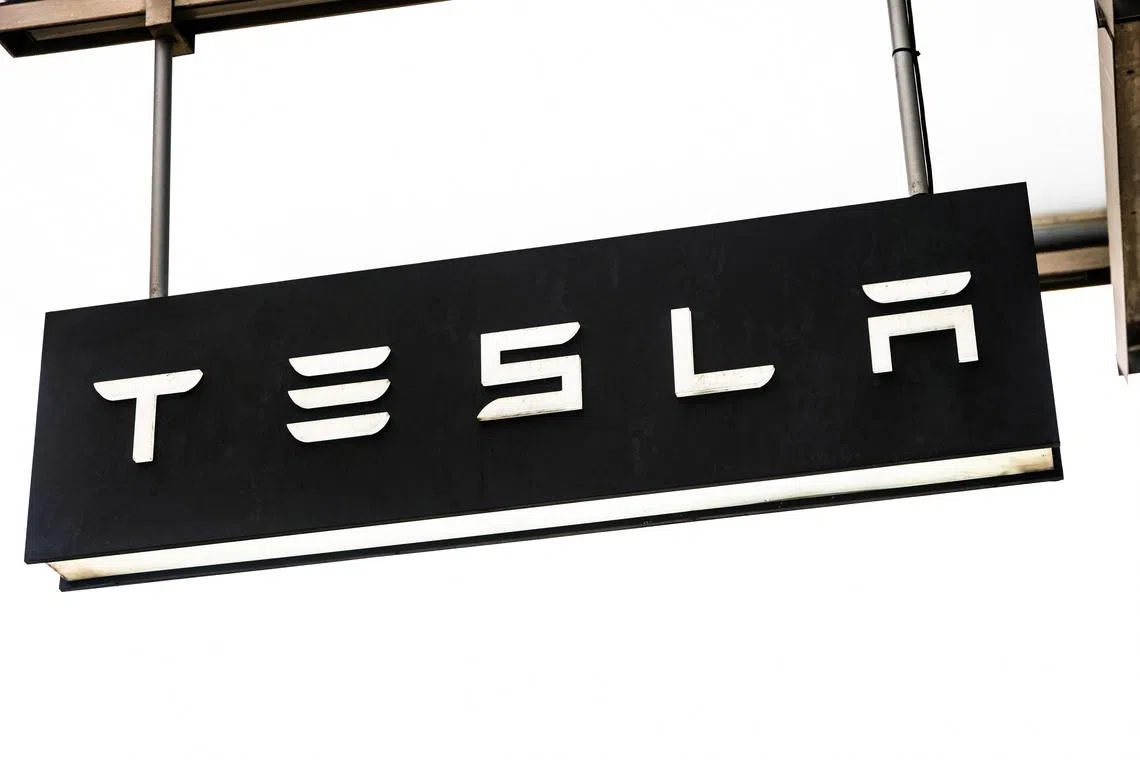Tesla plans to start building next-generation vehicles in mid-2025, sources say
Sign up now: Get ST's newsletters delivered to your inbox

Tesla said the next-generation vehicle would drive a new wave of growth.
PHOTO: AFP
SAN FRANCISCO/DETROIT – American automaker Tesla has told suppliers it wants to start production of a new mass market electric vehicle (EV) codenamed “Redwood” in mid-2025, according to four people familiar with the matter, with two of them describing the model as a compact crossover.
Tesla chief executive Elon Musk confirmed on a post-earnings call on Jan 24
That will be followed by Mexico and another factory outside North America to be decided later in 2024, he said, noting that ramping up production of the new vehicle would be challenging.
Mr Musk has long whetted fans’ and investors’ appetites for affordable EVs and self-driving robotaxis that are expected to be made on next-generation, cheaper electric car platforms.
Those models, including an entry-level US$25,000 (S$33,500) car, would allow it to compete with cheaper petrol-powered cars and a growing number of inexpensive EVs, such as those made by China’s BYD.
BYD overtook Tesla as the world’s top EV maker in the final quarter of 2023.
Tesla on Jan 24 said the next-generation vehicle would drive a new wave of growth.
“In 2024, our vehicle volume growth rate may be notably lower than the growth rate achieved in 2023, as our teams work on the launch of the next-generation vehicle at Gigafactory Texas,” Tesla said in a quarterly results report.
Mr Musk had first promised to build a US$25,000 car in 2020, a plan he later shelved and then revived. Tesla’s cheapest offering, the Model 3 sedan, currently has a starting price of US$38,990 in the United States.
Musk said in 2023 he was concerned about the impact of high interest rates on consumer demand for big-ticket items like cars.
Tesla sent “requests for quotes”, or invitation for bids for the “Redwood” model, to suppliers in 2023, and forecast a weekly production volume of 10,000 vehicles, two of the sources said.
Production would begin in June 2025, three of the sources said. All spoke on condition of anonymity because the matter is confidential.
Timing of next-generation compact vehicles was one of the most voted questions by investors to Tesla ahead of its quarterly results report on the afternoon of Jan 24, where it is expected to forecast a 21 per cent rise in 2024 deliveries, well below the long-term annual target of 50 per cent that Mr Musk set about three years ago.
Mr Musk said in May 2023 that Tesla was working on two new products, with the potential for combined sales of 5 million vehicles a year.
“Both the design of the products and manufacturing techniques are head and shoulders above anything else that is present in the industry,” he said at Tesla’s annual shareholder meeting.
Tesla plans to make an inexpensive robotaxi and an entry-level, $25,000 electric car based on the same vehicle architecture, according to a biography of Mr Musk released in September by journalist Walter Isaacson, which includes interviews with him and executives.
Mr Musk said in 2022 that Tesla would make a dedicated self-driving taxi with a futuristic look in 2024, after several misses at its goal of achieving full self-driving capability.
He and other Tesla executives laid out plans in March 2023 to halve the cost of its next-generation vehicles, but did not provide a timeframe for the launches.
Tesla has a track record of missing its targets for launches and pricing, and it would take time to build volume.
Cybertruck production, for instance, has been delayed and slow to accelerate and its US$60,990 starting price is 50 per cent higher than Mr Musk touted in 2019.
“They have been overly optimistic on most of their new product launches. Volume output is more likely to begin in 2026,” one of the sources said.
Mr Musk said on Jan 24: “I’m often optimistic regarding time. But our current schedule shows that we will start production towards the end of 2025“ and that “We’ll be sleeping on the line practically.”
Making a profit from the cheaper EVs will be challenging, given the costs of batteries as well as traditional difficulties producing quality inexpensive vehicles.
Tesla in recent years tore down a Honda Civic, whose price starts at US$23,950 in the US, to study how to make cheaper cars, two separate sources said.
The next-generation Tesla architecture, internally called “NV9X”, will include two or more models, said the two people and one of the initial sources.
Tesla also plans to build cheaper cars at its factory near Berlin, Germany, and is interested in building a factory in India to produce less expensive electric cars, sources said previously.
The EV maker also has factories in Shanghai and in Fremont, California. REUTERS


